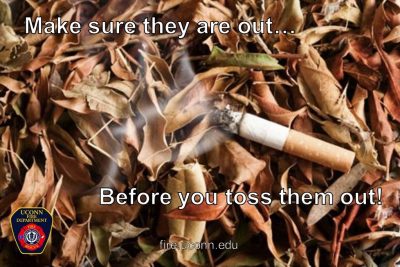
DO'S AND DON'TS
FIRE SAFETY
2020 Kitchen Fire Safety Video for Fire Prevention Week

In the month of June 2020, the UConn Fire Department has responded to an increasing number of outside fires in mulch beds and vegetative areas directly caused by discarded smoking materials. The majority of these fires have occurred at the UConn Health campus in Farmington.
Due to the recent severely dry weather conditions in Connecticut, the DEEP Forest Fire Danger has been in High Danger status or greater. As a result, discarded smoking materials can easily ignite dry vegetation and spread rapidly. This can impact the safety of those in clinical areas and cause extensive property damage in a very short amount of time.
Please be mindful of the location in which you dispose of any burning smoking materials, and use proper receptacles when available. As a reminder, smoking and tobacco use is not permitted on any property or in buildings owned by UConn Health, nor in other areas controlled or operated by UConn Health, including leased facilities, parking areas, garages, and access roads. Discarding of cigarette butts outside of vehicles is not permitted and subject to a littering infraction by the UConn Police Department.
At the UConn Storrs and Regional campus properties, smoking is prohibited in all University owned or leased buildings, facilities and vehicles, as well as within 25 feet of all campus buildings, including residence halls.
For more information, please review the Smoking and Tobacco Use Policies of your respective campus location, and visit the DEEP Forest Fire Danger page.
Please contact the UConn Fire Department via their Routine Line at (860) 486-4925 (Storrs) or (860) 679-4291 (UCH Farmington). Dial 911 for all emergencies.
IN CASE OF FIRE
- When Exiting Your Room and the Building:
- Feel the door handle with the back of your hand; if door handle is not hot, open cautiously.
- Check for smoke or fire before going out.
- Dress appropriately for weather conditions (i.e., coat, shoes, etc).
- Close and lock all doors. Bring your room key and ID card with you.
- Walk quickly to the nearest marked exit.
- Use the stairs. Never use elevators during an emergency evacuation.
- Carry a towel with you to cover your face.
- Stay low to the ground, below the smoke. Crawl if necessary.
- If Your Door Is Too Hot OR If There Is Heavy Smoke
- Do not open your door.
- Wedge a cloth around the door cracks and remain in the room.
- Call 911.
- Open the window wide enough to attract the attention of fire officials and await rescue.
- Once Outside of the Building
- Move away from the building and immediately report to the designated assembly area to check in with Residential Life staff.
- Maintain social distancing as practical.
- Stay clear of all emergency vehicles – do not stand in the roadway or walkway and block emergency vehicles from getting through.
- DO NOT re-enter the building until you are instructed to do so by an emergency responder or Residential Life staff.
RESIDENT FIRE SAFETY
All campus housing, dorms and apartments have fire alarm systems that report directly to UConn’s emergency dispatch center. To help ensure a fire-safe campus, the University has a list of items that are prohibited in residence halls:
- Candles and incense
- Open flame appliances
- Hot plates
- Halogen lights
- Open element heating devices, including toaster-ovens, household electric grills or grilling equipment, toasters, electric frying pans
- Hoverboards
- Electronic Cigarettes
Students are permitted to maintain certain UL approved appliances in their dormitories, limited to only UL approved coffee makers, popcorn poppers, and microwave ovens of 700 watts or less.
Certain cooking items are permitted within the kitchen areas of dormitory apartments only, which are limited to UL approved appliances such as coffee makers, popcorn poppers, toaster ovens, hot plates, microwave ovens and crock-pots.
Along with candles, smoking is banned from all residence halls and apartments. Also prohibited are combustibles, flammable liquids and substances of any type (fuel, kerosene, propane, oil, open paints or thinners, Sterno, charcoal). Charcoal or gas stoves and gas lamps, gasoline motors of any type, including motorcycles and mopeds, are prohibited.
FIRE SAFETY EQUIPMENT
The setting of fire, tampering with or misuse of fire safety equipment (including automatic door closures, smoke detectors, sprinkler heads, fire-alarm systems, fire-fighting equipment, or building security systems) is prohibited and illegal, including the covering or removal of smoke detectors.
If you hear the sound of fire alarm horns, everyone must immediately evacuate the building.
If a smoke detector goes off in your room, follow these procedures. These apply to smoke detectors only, and no other alarms sounding throughout the building:
- If there is fire, smoke and/or a burning odor is present:
- Leave the room and close the door behind you.
- Pull the Fire Alarm Pull Box located at the building exits.
- Evacuate the building.
- Call 911 to report the fire, or possible fire. Be prepared to give location, name, and phone number if possible.
- If there is NO evidence of any fire, smoke and/or a burning odor:
- Leave the room and close the door behind you.
- Call 911 from a safe location. Meet the responding Fire Department in a safe location outside of your room. Note: the Fire Department responds to all fire alarms including single smoke detector activation in a room whether or not the building fire alarm system is activated.
- If you subsequently discover evidence of fire, smoke and/or burning odor, follow directions outlined in step 1.